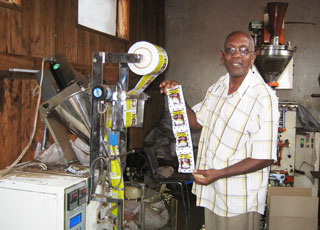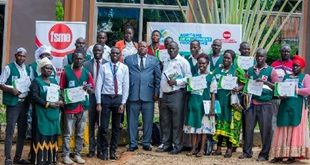
By Patrick Kagenda
Haji Abasi Kazibwe Musisi processes the Nguvu Coffee brand with an outlet at Natete to the west of Kampala. He tells The Independent’s Patrick Kagenda about the coffee roasting business.
What is Nguvu and how did it come about?
Nguvu is a brand name of the coffee which is manufactured by Kampala Jellytone Suppliers Ltd. For a product to be successful in the market you need to identify it and the only way you can identify it is by giving it a name that is not to be used by any other . Nguvu is a Swahili word for strength. We believe that when you take Nguvu coffee you are likely to gain strength. So the name fits the product.
How did you come into the coffee roasting business?
I worked with Standard Bank (present day Standard Chartered Bank) from 1971 to 1976. The expulsion of the Asians led to businesses losing focus and the bank was forced to close most of its branches. When I realised that there was no hope of being promoted I decided to start a business of my own. In 1976, I went home in Ankole to trade in matooke which I did for only six months then I came back to Kampala. Then I started a small business in manufacturing body jelly for ladies and babies. That is why we are called Kampala Jellytone Suppliers Ltd. Jelly`s being imported, we had a problem of getting the foreign currency which was only possible at the then Window II. It was here that I thought of what local raw material I could use that would yield returns. Coffee was readily available.
What happened next after you zeroed on coffee?
I collected a few bags of coffee. The farm gate price for a kilogram of coffee was at Shs 20-30. We used to crush the coffee in the mortar, sieve it using the local sieve for sieving millet flour and packing it in old newspapers which we would cut and make paper bags. I used to carry the coffee in a Kikapu (satchel made from palm leaves) and walk from shop to shop. It was difficult. People had earlier seen me working in a bank and now they were seeing me carrying a small satchel of coffee. Many wondered whether I had become insane. I persisted and after the small shops I managed to enter Kikuubo which was a huge trading zone in Kampala. As things went on improving, I acquired a roaster and shifted from roasting in ordinary pots. Luckily things continued to improve and I also upgraded on my machinery.
Have you ever got any support from the government?
I can say I am getting support from the government not in form of hard cash but in infrastructure development. If government makes a good road which enables me to transport my coffee then that is support. Even some of the government policies favour small manufacturers. The only bad policy is the recent ban on polythene packaging. They did not consider the fact that most of the foods both locally manufactured and imported are packaged in polythene. As manufacturers we thought it would be eminent to sensitise people on the best ways of disposing of the polythene bags.
What are the challenges that you encounter in your business?
When we had started coffee roasting way back in 1980, we were only using the whole bean. As the demand for coffee continued to raise, we are now forced even to use the inferior quality beans like the black beans, then down to BHP and later on when the market for BHP picked up and BHP began being exported as well, we are now competing with the exporters. We had to resort to an inferior quality called CP particles. At Nguvu, we cater for people of all income classes. Our coffee products range from coffee made from coffee bean particles up to BHP (Factory fresh coffee) up to the whole bean (Classic coffee) and they retail from Shs 100-Shs 5,000 packets.
Ugandans are not coffee drinkers. What is your view?
This is a result of the Whites who introduced the coffee plant into Uganda. They wanted to take most of the coffee produced in Uganda to their countries. They introduced tea and put allegations on coffee that when you take it you develop a couple of ailments. The problem is that people still have that colonial brainwashing living with them.
What makes your coffee so special that it has weathered all storms?
It’s the experience of 29 years in coffee roasting. I know how to roast coffee right from the poor quality to the best quality. The experience has made me know the requirements of every class.
Do you export your products?
I do not export. There is big demand locally. It has been my decision ever since I started the coffee business, to stay on the local market. When I tried to export to the European countries, they liked my coffee only that they asked for containers full of coffee beans because they want to protect their manufacturers. Finished coffee is seen as a threat to their local coffee roasters. So they protect their roasters. It’s not only Europe but even in the African countries. They all ask about how many containers of coffee beans I can supply them, yet I am interested in selling a finished product.
 The Independent Uganda: You get the Truth we Pay the Price
The Independent Uganda: You get the Truth we Pay the Price


